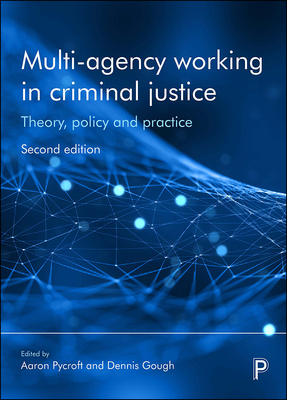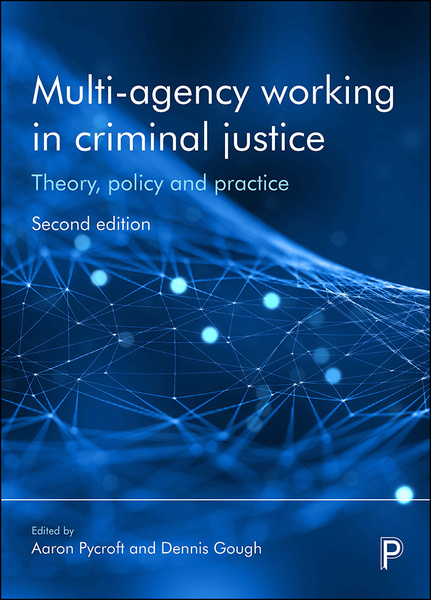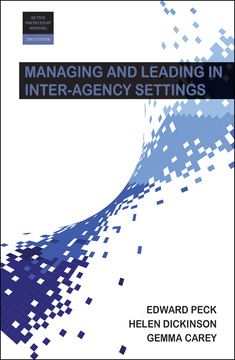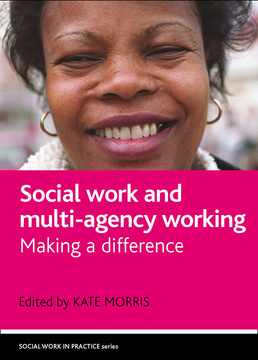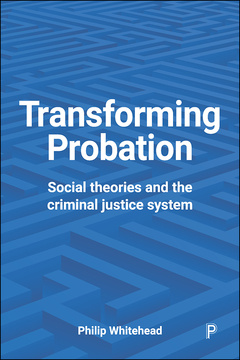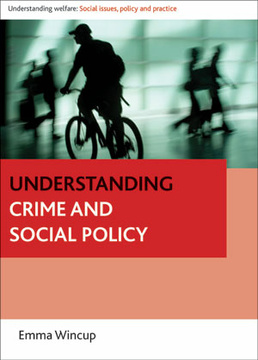Multi-Agency Working in Criminal Justice
Theory, Policy and Practice
Edited by Aaron Pycroft and Dennis Gough
Published
May 15, 2019Page count
308 pagesEdition
2nd EditionISBN
978-1447340249Dimensions
240 x 172 mmImprint
Policy PressPublished
May 15, 2019Page count
308 pagesEdition
2nd EditionISBN
978-1447340256Imprint
Policy PressPublished
May 15, 2019Page count
308 pagesEdition
2nd EditionISBN
978-1447340263Imprint
Policy PressMulti-agency working continues to be a core focus in criminal justice and allied work, with the government investing significantly in training criminal justice professionals. This fully revised and expanded edition of this comprehensive text brings together probation, policing, prison, social work, criminological and organisational studies perspectives, and is an essential guide for students and practitioners in offender management and other managed care environments. The contributors provide critical analysis of the latest theory, policy and practice of multi-agency working and each chapter includes case studies, key points, exercises and further reading.
“This fully updated book will be an invaluable resource to criminology students, and those training to become police or probation officers.” Iolo Madoc-Jones, Glyndŵr University
''There can be no doubt that multi-agency working has established itself as a key feature of the contemporary criminal justice landscape. This timely and accessible collection will be an invaluable resource for both established and trainee criminal justice practitioners, as well as students of criminal justice and social policy.'' Gwen Robinson, University of Sheffield
"This second edition is far more than an update. A new focus and numerous new contributors make this a 'state-of-the-art' resource on multi-agency work in criminal justice." Anne Worrall, Keele University
''This updated edition by Pycroft and Gough charts the key developments since 2010 which have shaped the governance of the penal field through the creation of new networks and partnership arrangements. This unique collection provides an engaging and thought-provoking lens that enhances contemporary understanding of the policies that underpin such work. I would wholeheartedly recommend Multi-Agency Working in Criminal Justice: Theory, Policy and Practice to students, practitioners, scholars and policy makers everywhere.'' Lawrence Burke, Liverpool John Moores University
''In times of considerable change and upheaval within the criminal justice system, this edited collection brings considerable insight into one of its contemporary phenomena, multi-agency working. The book successfully engages in practice and theoretical debate, locating multi-agency working in theories of late modernity and neoliberalism.'' John Deering, University of South Wales
‘‘This book addresses the key theoretical, policy and practice issues that inform multi-agency working at a time of acute austerity in criminal justice and related public services.’’ Jonathan Evans, University of South Wales
Aaron Pycroft is Reader in Criminal Justice and Social Complexity with the Institute of Criminal Justice Studies at the University of Portsmouth.
Dennis Gough is Senior Lecturer in Penology and Course Leader for the Professional Doctorate in Criminal Justice in the Institute of Criminal Justice Studies at the University of Portsmouth.
Introduction ~ Aaron Pycroft and Dennis Gough
Multi-agency working and the governance of crime control ~ Dennis Gough
From a trained incapacity to professional resistance in criminal justice ~ Aaron Pycroft
A time of change: the expanding role of Police and Crime Commissioners in local criminal justice delivery ~ Barry Loveday and Sue Roberts
Integrated offender management: a brave new world or business as usual? ~ Andy Williams
MAPPA: sex offenders and managing ‘the other’ in the community ~ Mike Nash
Protection and prevention: identifying, managing and monitoring priority perpetrators of domestic abuse ~ Jacki Tapley and Zoë Jackson
Policing a diverse society: the community based rationale for multi-agency working ~ Claudia Cox
The development of the police role in safeguarding children ~ John Fox
Hate crime, policing and multi-agency partnership working ~ Jemma Tyson and Nathan Hall
The complexity of partnerships in the UK Counter Terrorism Strategy. What might we learn from contemporary efforts to counter hate crime? ~ John Grieve
Interviewing children as suspects: the need for a child-centred approach ~ Lesley Laver
Culture Club Assemble! The powerful role of multi-agent relationships in prison habilitation ~ Sarah Lewis
Integrated secure care pathways for people with complex needs: service user, policy and practice perspectives ~ Graham Noyce
Removing the ‘dual’ and working with the presenting diagnosis: core processes of change ~ Anita Green and Aaron Pycroft
Offenders with mental health needs in the criminal justice system: the multi-agency challenge to provide solution-focused responses ~ Jane Winstone
Enforcement and rehabilitation: challenges to partnership working with substance using offenders ~ Marie-Edith Tiquet
The decline of youth offending teams: towards a progressive and positive youth justice ~ Nicholas Pamment







